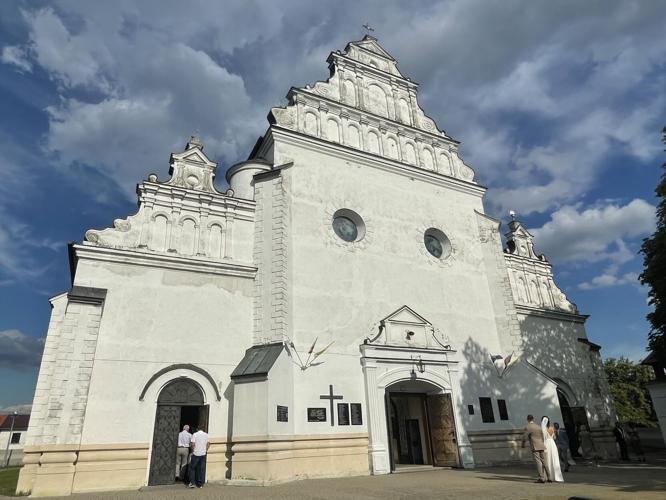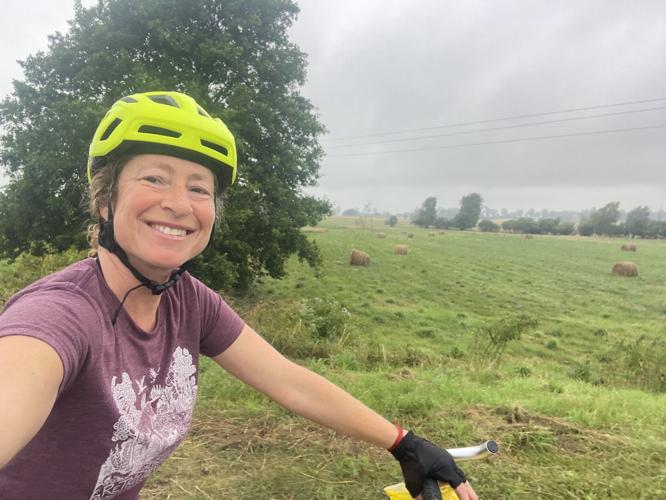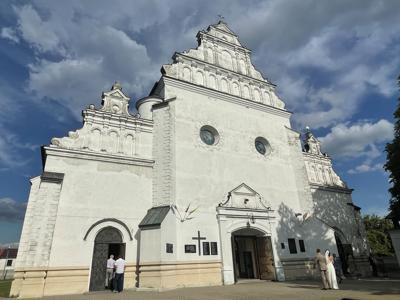I arrived in Krakow with a grand vision. Daunting and haunting as I knew it might be, I wanted to bicycle through Poland and Germany, lands of complexity and paradox, of memory and pain. Personal pain.
For many with direct ties to the Holocaust, the atrocities of history make these lands feel unapproachable. But as the daughter of Max (Meyer) Widawski, survivor of 11 concentration camps, I also inherited a sense of resilience and hope. For years, I had felt a calling to my roots and to the trees that bore witness to more than we can imagine. I craved mutual connection and healing with nature, and with Germans and Poles, who are also, in a different way, descendants of this terrible chapter in time.
I had a loose plan, but in Krakow, I felt propelled by an indescribable momentum, enthralled by the cobblestone streets with Yiddish signs, the standing synagogues, and the delicious bar mleczny (milk bars) serving pierogies, borscht and other foods that tasted like home.

‘It was life, not death, that I was seeking on this trip,’ writes Chana Widawski.
Chana WidawskiSoon I had myself a second-hand bicycle, used waterproof panniers and a route to Lodz (the Polish city closest to my father’s town). I also met new local friends eager to help me. They embraced my father’s story and shared their own.
Terrified and energized, I packed up everything I needed and set out in the rain. I stopped at a piekarnia (bakery) to fuel up on jagodzianki. Each bite of the heavenly blueberry buns reminded me of my father and our shared love of similar buns in Toronto’s Jewish bakeries. I wondered how he, now deceased, would feel about my journey.
I first pedalled for four days, beginning with a section of the , one of Poland’s many bicycle routes, rife with incredible limestone outcrops, medieval castles and storied forests.
I pitched my tent by lakes and ponds, treated myself to nourishing meals with the same Eastern European flavours that sustained my childhood, and shared stories with locals despite immense language barriers. I held all those who perished, who killed, who stood by and who helped in my thoughts. I listened to the trees and felt both their gifts and their helplessness.

A view along the Trail of the Eagle’s Nest, one of Poland’s many bicycle routes.
Chana WidawskiWhen I set out on this trip, I merely hoped to breathe in the space of my dad’s youth, but when a local researcher I contacted found his actual address, along with family burial plots, old marriage documents and his mother’s childhood home, history came alive. I stayed in Lodz for a couple of days, savoring this information (and perfectly brined homemade pickles) in the comfort of a new friend’s apartment, coincidentally on my grandmother’s street.
I pedalled to the town of Poddebice, Poland, walked the cobblestone streets where my dad played and watched the river flow where he splashed with friends. I stood in the church where my grandparents and all others from the town’s ghetto were held before being transported to Chelmno, the death camp where they perished. I walked those ash-filled grounds and saw the mass graves, the heart-wrenching memorial plaques, and the place where the notorious gas vans delivered their death fumes.
But it was life, not death, that I was seeking on this trip. I made my way to the lakeside town of Feldafing, Germany, where, after liberation from Dachau, my father, parentless, regained life in a displaced persons’ camp. I hugged the trees, picked wild berries and swam in the shimmering lake, animated by thoughts of my father and other survivors finally eating proper meals and living vibrantly here, in what was once a Nazi school (now an army base).

The writer’s late father, Max (Meyer) Widawski, inspired her recent bicycling trip through Poland and Germany.
Courtesy of Chana WidawskiPoddebice and Feldafing were two places where I had wanted to camp, breathing fresh night air and slumbering to the sound of nightingales. But in both towns, I had the good fortune of meeting more new friends, whose families have been here for generations. They opened their hearts and homes, shared their wealth of knowledge, brought me to places I would have never known, and told me their own stories connected to our collective Holocaust trauma. We embraced each other with empathy, staying up late sharing laughter and tears.
Although my panniers were full of gear, the most important thing I had with me was openness. Connecting physically and emotionally with my father’s story, I felt a weight lifted from me, allowing room for powerful memories of this trip: rich conversations, inner dialogue and deep, new friendships that will be with me forever. I left with a strengthened vision for a peaceful future, where we all cherish our interconnectedness and shared humanity.

































To join the conversation set a first and last name in your user profile.
Sign in or register for free to join the Conversation